
KINETICS AND CATALYSIS
Scope & Guideline
Decoding Chemical Reactions with Precision
Introduction
Aims and Scopes
- Catalytic Mechanisms and Kinetics:
The journal explores various catalytic mechanisms, emphasizing the kinetics of reactions catalyzed by metals, metal oxides, and other catalytic materials. This includes detailed studies on reaction rates, mechanisms, and the impact of various conditions on catalytic performance. - Development of Novel Catalysts:
Research on the synthesis and characterization of new catalytic materials, including heterogeneous, homogeneous, and biocatalysts, is a core focus. This includes studies on metal nanoparticles, zeolites, and composite materials. - Environmental and Green Chemistry:
The journal emphasizes the role of catalysis in environmental applications, including the degradation of pollutants, renewable energy conversions (like hydrogen production), and the synthesis of sustainable fuels and chemicals. - Theoretical and Computational Studies:
A significant portion of the research includes theoretical studies, such as density functional theory (DFT) and kinetic modeling, to understand and predict the behavior of catalysts and catalytic reactions. - Interdisciplinary Approaches:
The journal encourages interdisciplinary research that combines chemistry, materials science, and engineering to address complex problems in catalysis and reaction kinetics.
Trending and Emerging
- Photocatalysis and Sustainable Energy:
There is a growing interest in photocatalytic processes, particularly those aimed at sustainable energy production and pollutant degradation. This trend reflects the global shift towards renewable energy sources and environmentally friendly technologies. - Nanocatalysts and Nanostructured Materials:
Research on nanostructured catalysts, including nanoparticles and nanocomposites, is becoming increasingly prominent. These materials often demonstrate enhanced catalytic performance and selectivity, driving innovation in catalyst design. - Machine Learning and Data-Driven Approaches:
The integration of machine learning and big data analysis in catalysis research is emerging as a significant trend, facilitating the discovery of new catalysts and optimization of catalytic processes. - Biocatalysis and Green Chemistry:
There is an increasing focus on biocatalysts and enzymatic processes, which align with the principles of green chemistry. This trend highlights the importance of sustainable methods in chemical synthesis. - Advanced Characterization Techniques:
Research utilizing advanced characterization techniques, such as in situ spectroscopy and microscopy, is trending. These methods provide deeper insights into catalyst behavior and reaction mechanisms, enhancing the understanding of catalytic processes.
Declining or Waning
- Conventional Catalytic Processes:
There has been a noticeable decline in papers focusing solely on traditional catalytic processes without novel modifications or innovative approaches. Research is increasingly directed towards more advanced catalytic systems. - Basic Kinetic Studies without Novel Insights:
Papers that present basic kinetic studies without new theoretical frameworks or applications are becoming less common. The journal is favoring studies that offer innovative methodologies or applications in real-world scenarios. - Single-Metal Catalysts:
The emphasis on single-metal catalysts has decreased as research is increasingly oriented towards bimetallic and composite catalytic systems, which are often more effective and versatile. - Studies on Non-Catalytic Reactions:
Research focusing on non-catalytic reaction kinetics is less frequently published, as the journal's direction shifts towards catalytic applications and their efficiencies.
Similar Journals

JOURNAL OF CHEMICAL SCIENCES
Empowering Chemists: Open Access to Scientific ExcellenceThe JOURNAL OF CHEMICAL SCIENCES, published by the Indian Academy of Sciences, is a premier academic journal that serves the global community of chemists and researchers. With an ISSN of 0974-3626 and an E-ISSN of 0973-7103, this journal is pivotal in disseminating high-quality research across diverse areas of chemical sciences. As of 2023, it holds a respectable Q3 ranking in the field of Chemistry (miscellaneous) and ranks #215 out of 408 in General Chemistry according to Scopus, reflecting its commitment to advancing the discipline. Operating in an open-access format, the journal ensures that research findings are readily accessible to a broader audience, fostering collaboration and innovation. Established in 1980 and continuing to evolve, the journal's scope encompasses fundamental and applied chemistry, and aims to bridge gaps between theoretical and practical applications. With a mission to support the scientific community, the JOURNAL OF CHEMICAL SCIENCES is an essential resource for researchers, professionals, and students alike, providing a platform for the exchange of groundbreaking ideas and discoveries.
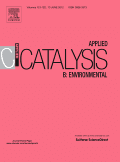
Applied Catalysis B-Environment and Energy
Advancing sustainable solutions for a greener tomorrow.Applied Catalysis B-Environment and Energy, published by Elsevier, is a leading journal in the fields of catalysis, environmental science, and process chemistry, with an impressive impact factor that reflects its significance in advancing research and innovation. Established in 1992, this esteemed journal has earned a prestigious status as evidenced by its 2023 category quartiles—ranking in the Q1 category for Catalysis, Environmental Science, and Process Chemistry and Technology. With consistently high rankings in the Scopus database, it holds a remarkable position as #1 in General Environmental Science and #2 in both Process Chemistry and Catalysis, showcasing its profound impact on the respective fields. The journal’s scope encompasses both theoretical and practical research, targeting the pivotal developments in catalysis that promote sustainable practices and energy efficiency. Researchers, professionals, and students alike will find invaluable insights and cutting-edge studies published within its pages, making it an essential resource for those invested in pioneering advancements for a greener, more energy-efficient future.

Catalysts
Pioneering Discoveries in Heterogeneous and Homogeneous CatalysisCatalysts is a leading academic journal in the field of catalysis, published by MDPI since 2011 and well-regarded for its commitment to open access publishing. Based in Switzerland, this journal delivers innovative research and reviews that span various aspects of catalysis, from heterogeneous and homogeneous catalysis to the development of novel catalytic systems. With a commendable impact factor and a notable Q2 ranking in both Catalysis and Physical and Theoretical Chemistry categories, Catalysts plays a critical role in advancing the scientific discourse in these fields. The open-access model ensures that all research articles are readily accessible to researchers and professionals worldwide, fostering collaboration and accessibility to high-quality scientific literature. As the journal continues to publish cutting-edge studies up to its convergence in 2024, it remains an essential resource for anyone involved in catalysis research, from seasoned professionals to emerging scholars.

DOKLADY PHYSICAL CHEMISTRY
Elevating Knowledge in Physical and Theoretical ChemistryDOKLADY PHYSICAL CHEMISTRY is a prominent peer-reviewed journal published by MAIK NAUKA/INTERPERIODICA/SPRINGER, focusing on advancements and research in the field of Physical and Theoretical Chemistry. With the ISSN 0012-5016 and E-ISSN 1608-3121, this journal serves as a vital platform for researchers and practitioners to disseminate their findings and insights from 1996 to the present. Despite its current Q4 ranking in the 2023 category of Physical and Theoretical Chemistry, the journal has shown significant potential for visibility and engagement within the academic community, ranking #149 out of 189 in its respective field according to Scopus metrics, highlighting its dedicated readership. While the journal is not open access, it remains an essential resource for those seeking in-depth research articles, reviews, and commentary within this dynamic discipline. As the field continues to evolve, DOKLADY PHYSICAL CHEMISTRY plays a crucial role in fostering scientific dialogue and collaboration among researchers, professionals, and students worldwide.
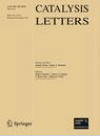
CATALYSIS LETTERS
Advancing the Science of CatalysisCATALYSIS LETTERS, published by Springer, is a distinguished journal dedicated to presenting original research and review articles in the field of catalysis and its various applications. Serving the scientific community since 1988, this journal has continuously evolved, providing a platform for the dissemination of innovative findings that advance the understanding and development of catalytic processes. With an esteemed Q3 ranking in Catalysis and a Q2 ranking in miscellaneous Chemistry for 2023, CATALYSIS LETTERS underscores its relevance and impact within these critical fields. Although it does not offer open access, the journal remains a crucial resource for researchers, professionals, and students seeking to stay updated on contemporary advancements and discussions in catalysis. Its Scopus rankings further affirm its contribution to general chemistry and chemical engineering, making it an essential publication for those immersed in this dynamic area of study.
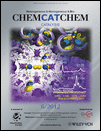
ChemCatChem
Elevating Chemical Understanding Through Rigorous Research.ChemCatChem is a leading international journal published by WILEY-V C H VERLAG GMBH that has been making significant contributions to the fields of catalysis, inorganic and organic chemistry, as well as physical and theoretical chemistry since its inception in 2009. With an established reputation for excellence, this journal holds commendable rankings in various categories, including Q1 in Inorganic Chemistry and Q1 in Organic Chemistry, demonstrating its pivotal role in advancing scientific knowledge and innovation. Notably, it has achieved a high Scopus ranking, securing 10th place out of 79 in Inorganic Chemistry, among others, showcasing its influence and quality. Although open access options are not available, the journal offers cutting-edge research articles, reviews, and insights that are vital for researchers, professionals, and students aiming to stay at the forefront of chemical science. With its address rooted in Weinheim, Germany, and convergence projected to continue until 2024, ChemCatChem remains a dynamic platform for disseminating vital advancements within the chemical community.
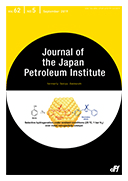
JOURNAL OF THE JAPAN PETROLEUM INSTITUTE
Advancing Energy Innovation for a Sustainable FutureJOURNAL OF THE JAPAN PETROLEUM INSTITUTE, published by the Japan Petroleum Institute, is a leading scholarly journal dedicated to advancing research and innovation in the fields of Energy Engineering, Fuel Technology, and related disciplines. With an ISSN of 1346-8804 and an E-ISSN of 1349-273X, the journal has established a significant presence within the academic community, recognized for its impact and rigor, as evidenced by its Q3 quartile rankings in both Energy Engineering and Power Technology and Fuel Technology as of 2023. The journal, which converges research from 2002 to 2024, provides a vital platform for researchers, professionals, and students to share their findings and insights into petroleum-related challenges and advancements. While specific metrics such as HIndex are not stated, the journal's inclusion in leading academic databases reflects its commitment to quality and accessibility in research dissemination. Readers can view the journal's open access options to engage with cutting-edge studies that contribute to the sustainable advancements in energy resources and technology. Situated in Tokyo, Japan, this journal continues to play an essential role in fostering dialogue and discovery within the petroleum research community.
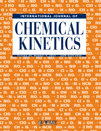
INTERNATIONAL JOURNAL OF CHEMICAL KINETICS
Charting the course of kinetic research across disciplines.The INTERNATIONAL JOURNAL OF CHEMICAL KINETICS, published by Wiley, is a leading journal that covers significant advancements and fundamental research in the field of chemical kinetics. Established in 1969, this peer-reviewed journal not only emphasizes kinetics in solution and gas-phase reactions but also addresses theoretical approaches and experimental applications in various branches of chemistry including biochemistry, inorganic chemistry, organic chemistry, and physical chemistry. As of 2023, it holds a respectable Q2 ranking in Inorganic Chemistry and Q3 in the other chemistry categories, reflecting its substantial impact on the scientific community. With a commitment to disseminating high-quality research, the journal is an indispensable resource for researchers, educators, and students seeking to deepen their understanding of chemical dynamics. Its compilation of articles and reviews ensures that it remains a cornerstone for innovative studies and discussions within the field.

Chem Catalysis
Fostering collaboration for transformative chemical solutions.Chem Catalysis is a leading academic journal published by CELL PRESS, specializing in the diverse and dynamic field of chemistry. Since its inception in 2021, this open-access journal has rapidly ascended to prominence, holding Q1 quartile rankings in prestigious categories including Chemistry (Miscellaneous), Organic Chemistry, and Physical and Theoretical Chemistry. With its Scopus rankings placing it in the top tiers—Rank #14 in Organic Chemistry and Rank #12 in Miscellaneous Chemistry—Chem Catalysis serves as a vital platform for disseminating innovative research and catalysis science. Researchers and professionals seeking to stay abreast of cutting-edge developments will find this journal indispensable for advancing their knowledge and contributions to the field. Located in Cambridge, Massachusetts, Chem Catalysis is committed to fostering collaboration and innovation in the chemical sciences, paving the way for breakthroughs that address global challenges.
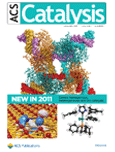
ACS Catalysis
Pioneering Research for Tomorrow's Catalytic ChallengesACS Catalysis, published by the American Chemical Society, stands as a premier journal in the field of catalysis, offering a vital platform for researchers, professionals, and students focused on advancing the science of catalysis and its applications. With an impressive impact factor placing it in the Q1 category for both Catalysis and Chemistry (miscellaneous), this journal has established itself as a leading source of high-quality research findings, currently ranking #21 out of 408 in General Chemistry and #9 out of 68 in Catalysis according to Scopus. Since its inception in 2011, ACS Catalysis has aimed to publish innovative research that addresses the critical challenges in catalytic processes, advancing our understanding of both fundamental and applied aspects of catalysis. With a commitment to promoting open scientific discourse, it serves a vital role for those interested in the latest methodologies, discoveries, and trends in this essential discipline. Based in Washington, DC, ACS Catalysis continues to uphold the highest standards of scholarship and collaboration within the vibrant community of chemists and engineers worldwide.